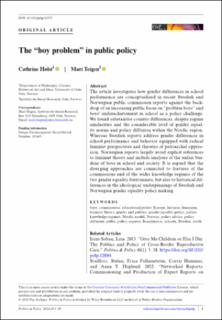| dc.description.abstract | The article investigates how gender differences in school performance are conceptualized in recent Swedish and Norwegian public commission reports against the backdrop of an increasing public focus on “problem boys” and boys' underachievement in school as a policy challenge. We found substantive country differences, despite regime similarities and the considerable level of gender equality norms and policy diffusion within the Nordic region. Whereas Swedish reports address gender differences in school performance and behavior equipped with radical feminist perspectives and theories of patriarchal oppression, Norwegian reports largely avoid explicit references to feminist theory and include analyses of the unfair burdens of boys in school and society. It is argued that the diverging approaches are connected to features of the commissions and of the wider knowledge regimes of the two gender equality forerunners, but also to historical differences in the ideological underpinnings of Swedish and Norwegian gender equality policy making. | |
